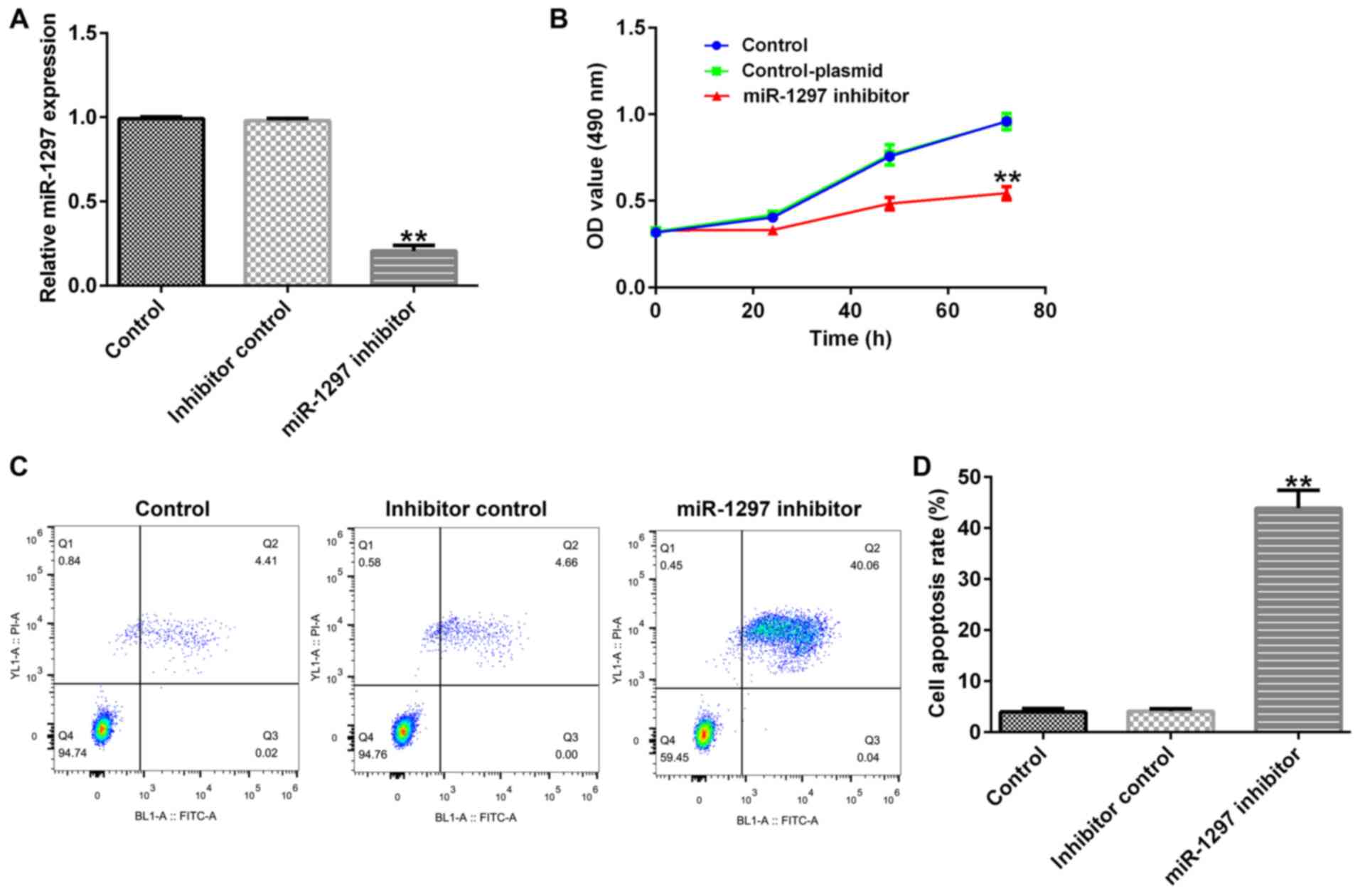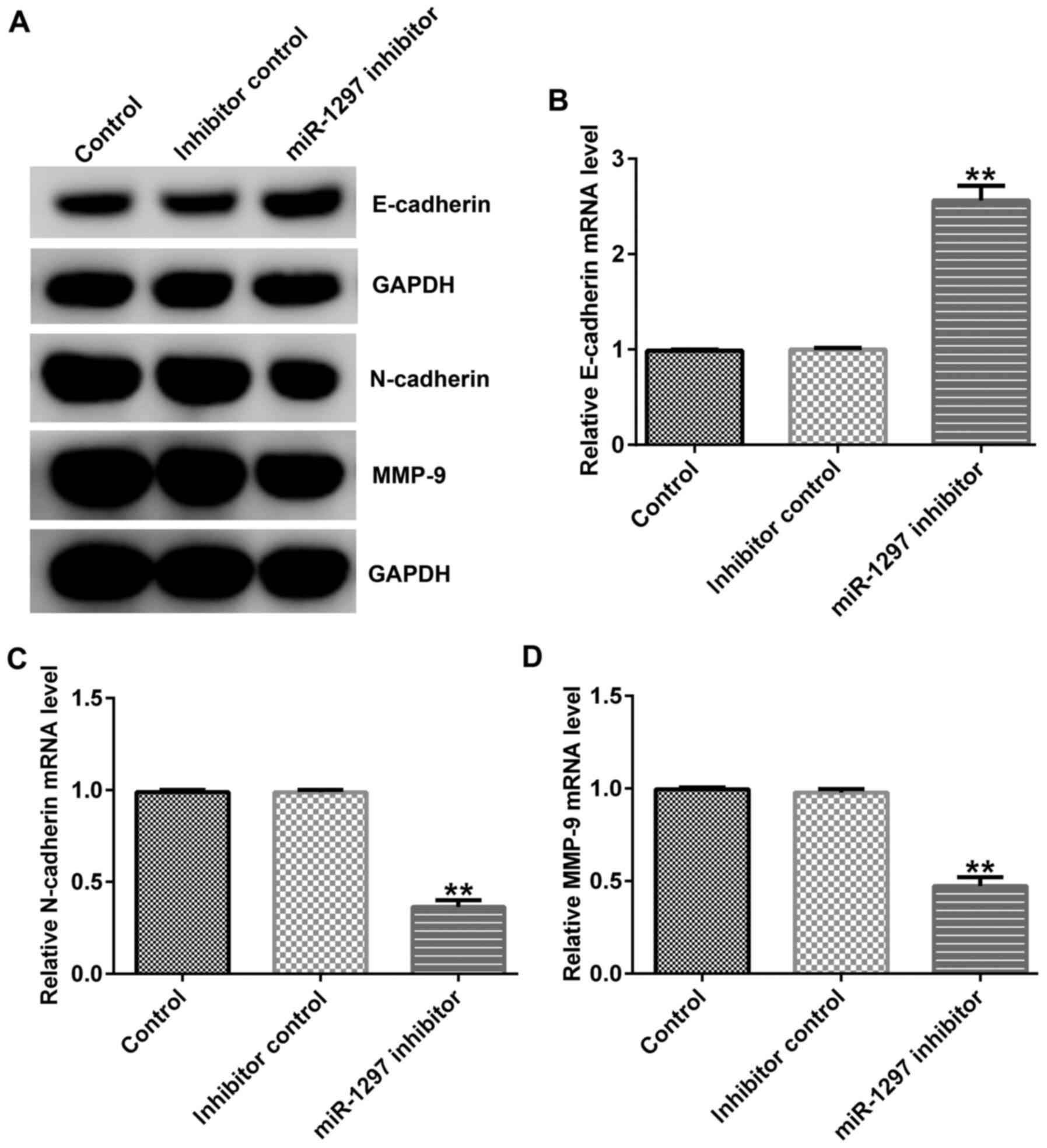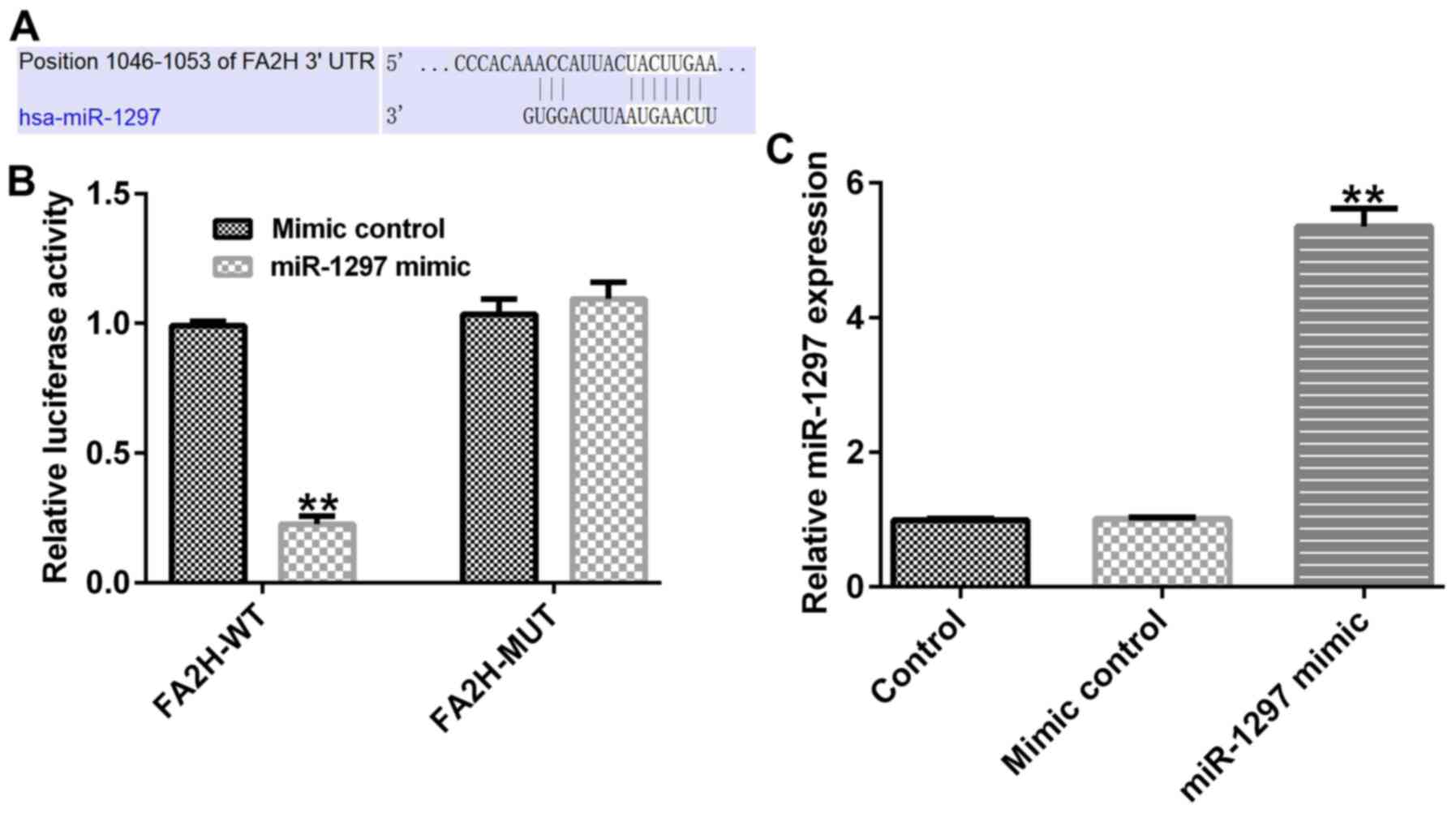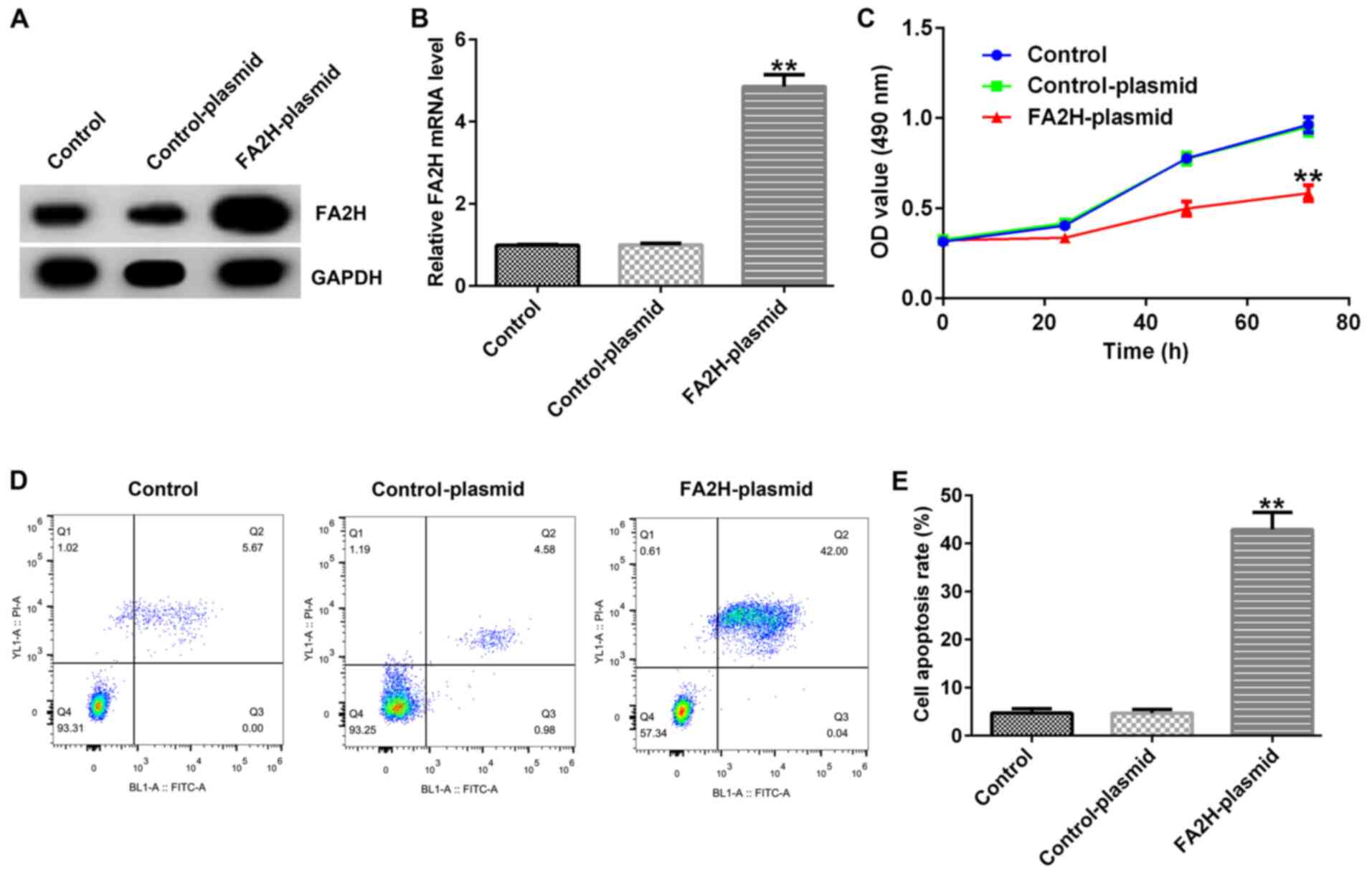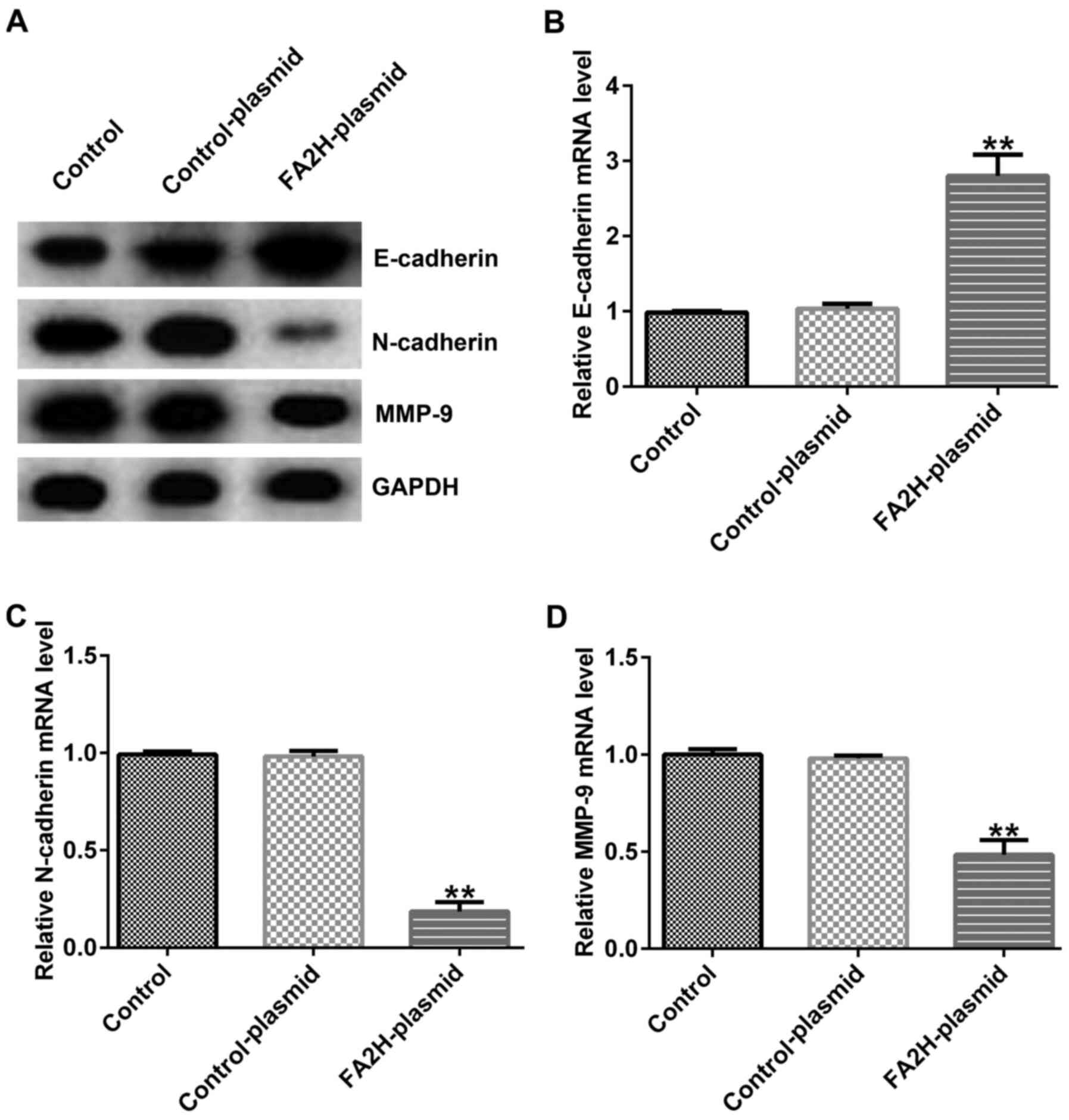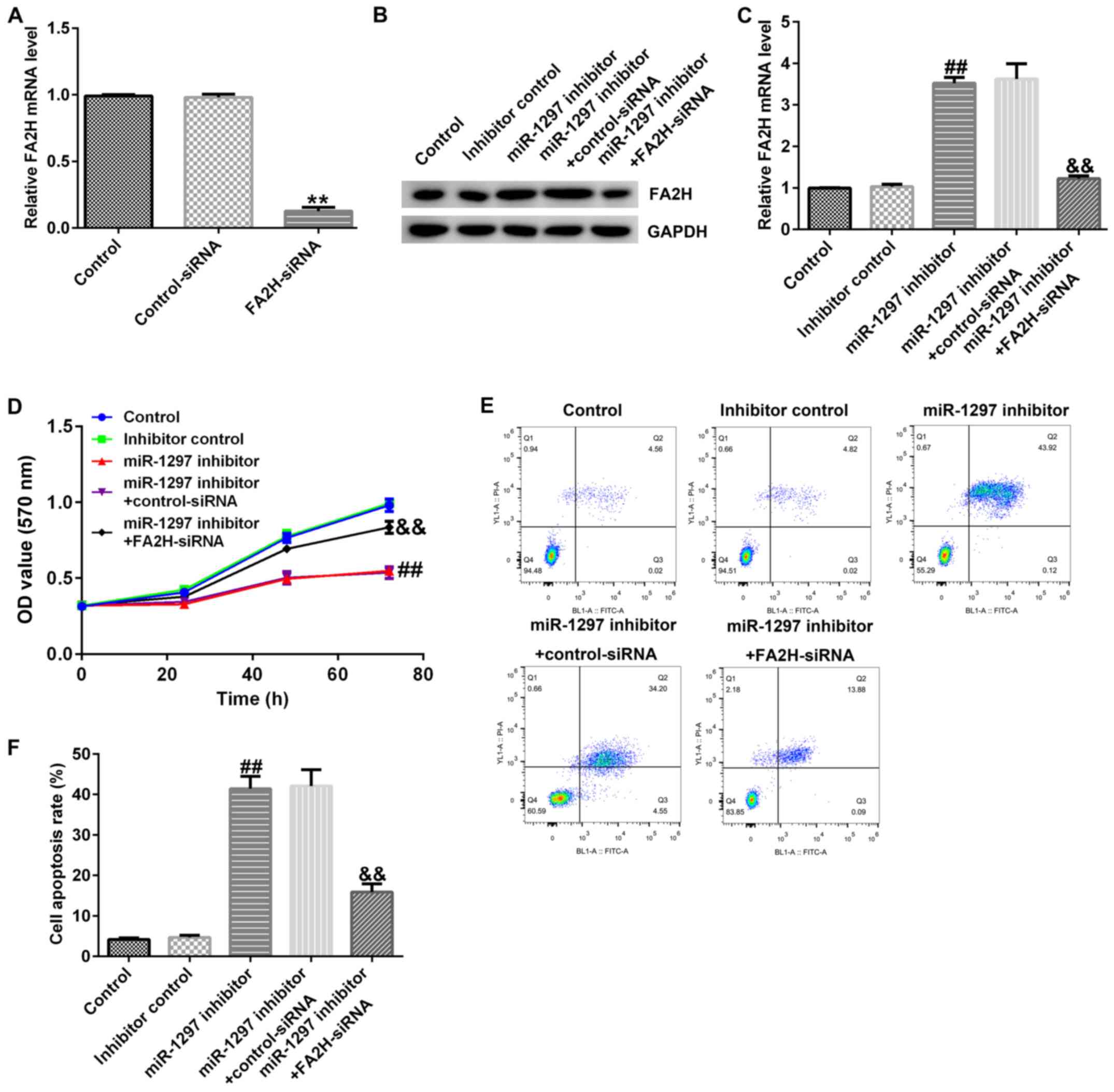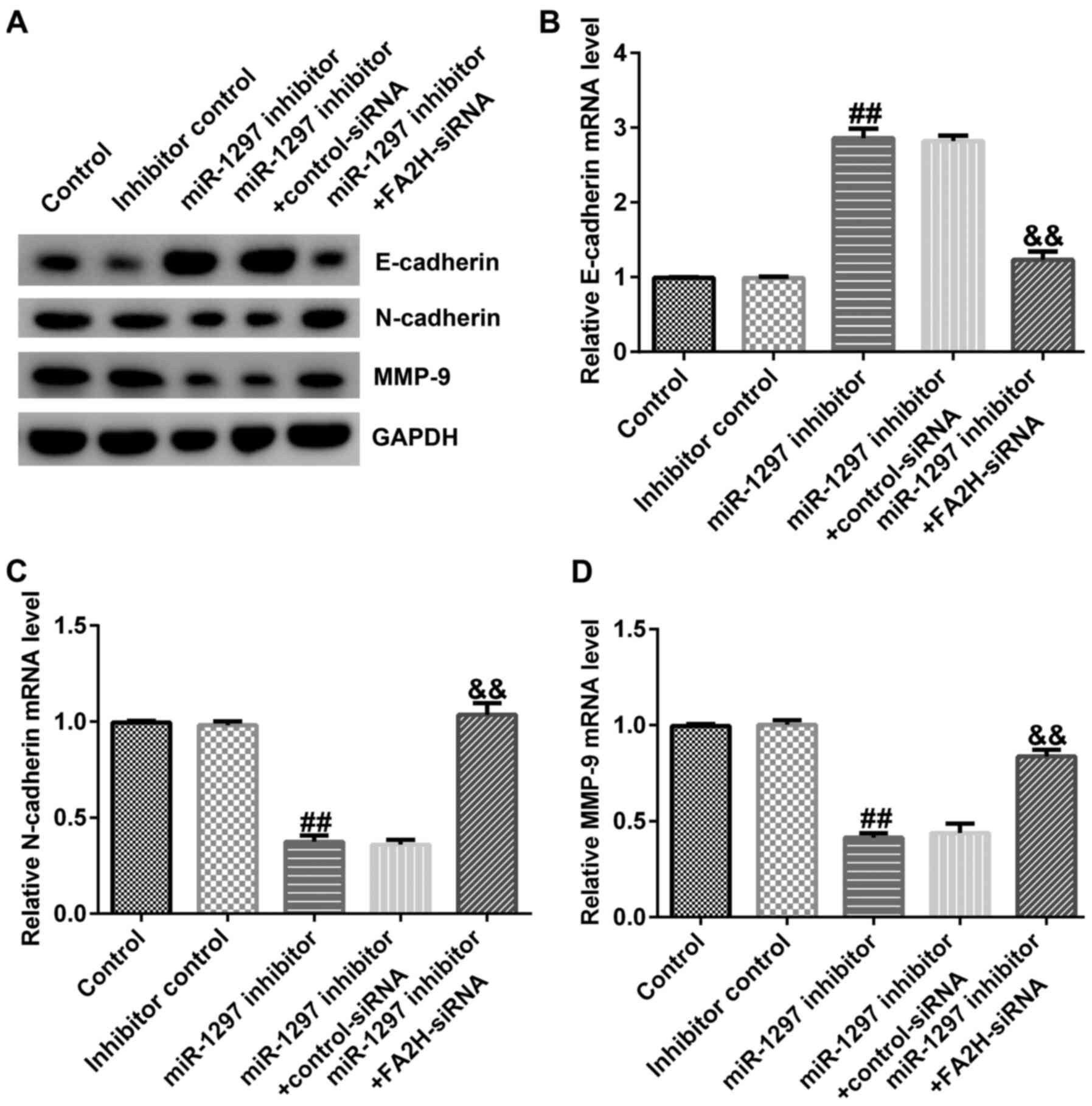|
1
|
Siegel RL, Miller KD and Jemal A: Cancer
statistics. 2017. CA Cancer J Clin. 67:7–30. 2017. View Article : Google Scholar : PubMed/NCBI
|
|
2
|
DeSantis CE, Ma J, Goding Sauer A, Newman
LA and Jemal A: Breast cancer statistics, 2017, racial disparity in
mortality by state. CA Cancer J Clin. 67:439–448. 2017. View Article : Google Scholar : PubMed/NCBI
|
|
3
|
Gupta I, Burney I, Al-Moundhri MS and
Tamimi Y: Molecular genetics complexity impeding research progress
in breast and ovarian cancers. Mol Clin Oncol. 7:3–14. 2017.
View Article : Google Scholar : PubMed/NCBI
|
|
4
|
Li P, Xu T, Zhou X, Liao L, Pang G, Luo W,
Han L, Zhang J, Luo X, Xie X and Zhu K: Downregulation of miRNA-141
in breast cancer cells is associated with cell migration and
invasion: Involvement of ANP32E targeting. Cancer Medicine.
6:662–672. 2017. View Article : Google Scholar : PubMed/NCBI
|
|
5
|
DeSantis C, Ma J, Bryan L and Jemal A:
Breast cancer statistics, 2013. CA Cancer J Clin. 64:52–62.
2014.PubMed/NCBI
|
|
6
|
Bartel DP: MicroRNAs: Genomics,
biogenesis, mechanism, and function. Cell. 116:281–297.
2004.PubMed/NCBI
|
|
7
|
Mo YY: MicroRNA regulatory networks and
human disease. Cell Mol Life Sci. 69:3529–3531. 2012.PubMed/NCBI
|
|
8
|
Laffont B and Rayner KJ: MicroRNAs in the
pathobiology and therapy of atherosclerosis. Can J Cardiol.
33:313–324. 2017.PubMed/NCBI
|
|
9
|
Ambros V: The functions of animal
microRNAs. Nature. 431:350–355. 2004.PubMed/NCBI
|
|
10
|
Ren Y, Chen Y, Liang X, Lu Y, Pan W and
Yang M: miRNA-638 promotes autophagy and malignant phenotypes of
cancer cells via directly suppressing DACT3. Cancer Lett.
390:126–136. 2017.PubMed/NCBI
|
|
11
|
Zhan MN, Yu XT, Tang J, Zhou CX, Wang CL,
Yin QQ, Gong XF, He M, He JR, Chen GQ and Zhao Q: MicroRNA-494
inhibits breast cancer progression by directly targeting PAK1. Cell
Death Dis. 8:e25292017.PubMed/NCBI
|
|
12
|
Wang C, Li QB, Liu F, Chen X, Nesa EU,
Guan SH, Liu BW, Han LH, Tan BX, Wang D, et al: Serum miR-1297: A
promising diagnostic biomarker in esophageal squamous cell
carcinoma. Biomarkers. 21:517–522. 2016.PubMed/NCBI
|
|
13
|
Ju HQ, Lu YX, Chen DL, Tian T, Mo HY, Wei
XL, Liao JW, Wang F, Zeng ZL, Pelicano H, et al: Redox regulation
of stem-like cells though the CD44v-xCT axis in colorectal cancer:
Mechanisms and therapeutic implications. Theranostics. 6:1160–1175.
2016.PubMed/NCBI
|
|
14
|
Zhang C, Chi YL, Wang PY, Wang YQ, Zhang
YX, Deng J, Lv CJ and Xie SY: miR-511 and miR-1297 inhibit human
lung adenocarcinoma cell proliferation by targeting oncogene TRIB2.
PLoS One. 7:e460902012.PubMed/NCBI
|
|
15
|
Wang J, Xu X, Mo S, Tian Y, Wu J, Zhang J
and Zhao J: Involvement of microRNA-1297, a new regulator of HMGA1,
in the regulation of glioma cell growth in vivo and in vitro. Am J
Transl Res. 8:2149–2158. 2016.PubMed/NCBI
|
|
16
|
Wu XJ, Pu XM, Zhao ZF, Zhao YN, Kang XJ,
Wu WD, Zou YM, Wu CY, Qu YY, Zhang DZ, et al: The expression
profiles of microRNAs in Kaposi's sarcoma. Tumour Biol. 36:437–446.
2015.PubMed/NCBI
|
|
17
|
Chen Z, Ma Y, Pan Y, Zhu H, Yu C and Sun
C: miR-1297 suppresses pancreatic cancer cell proliferation and
metastasis by targeting MTDH. Mol Cell Probes. 40:19–26.
2018.PubMed/NCBI
|
|
18
|
Gao W, Cao Y, Guo P, Bao X, Zhu H, Zheng
J, Yao C, Chen D, Yu S, Chen B, et al: Downregulation of miR-1297
predicts poor prognosis and enhances gastric cancer cell growth by
targeting CREB1. Biomed Pharmacother. 105:413–419. 2018.PubMed/NCBI
|
|
19
|
Li X, Wang HL, Peng X, Zhou HF and Wang X:
miR-1297 mediates PTEN expression and contributes to cell
progression in LSCC. Biochem Biophys Res Commun. 427:254–260.
2012.PubMed/NCBI
|
|
20
|
Liu C, Liu ZK, Li X, Tang XJ, He JJ and Lu
SY: MicroRNA-1297 contributes to tumor growth of human breast
cancer by targeting PTEN/PI3K/AKT signaling. Oncol Rep.
38:2435–2443. 2017.PubMed/NCBI
|
|
21
|
Liu F, He Y, Shu R and Wang S:
MicroRNA-1297 regulates hepatocellular carcinoma cell proliferation
and apoptosis by targeting EZH2. Int J Clin Exp Pathol.
8:4972–4980. 2015.PubMed/NCBI
|
|
22
|
Ling L, Feng L and Wei B: MicroRNA-1297
involves in the progression of oral squamous cell carcinoma through
PTEN. Saudi J Biol Sci. 25:923–927. 2018.PubMed/NCBI
|
|
23
|
Guo L, Zhang X, Zhou D, Okunade AL and Su
X: Stereospecifificity of fatty acid 2-hydroxylase and differential
functions of 2-hydroxy fatty acid enantiomers. J Lipid Res.
53:1327–1335. 2012.PubMed/NCBI
|
|
24
|
Alderson NL, Rembiesa BM, Walla MD,
Bielawska A, Bielawski J and Hama H: The human FA2H gene encodes a
fatty acid 2-hydroxylase. J Biol Chem. 279:48562–48568.
2004.PubMed/NCBI
|
|
25
|
Eckhardt M, Yaghootfam A, Fewou SN, Zöller
I and Gieselmann V: A mammalian fatty acid hydroxylase responsible
for the formation of alpha-hydroxylated galactosylceramide in
myelin. Biochem J. 388((Pt 1)): 245–254. 2005.PubMed/NCBI
|
|
26
|
Yao Y, Yang X, Sun L, Sun S, Huang X, Zhou
D, Li T, Zhang W, Abumrad NA, Zhu X, et al: Fatty acid
2-hydroxylation inhibits tumor growth and increases sensitivity to
cisplatin in gastric cancer. EBioMedicine. 41:256–267.
2019.PubMed/NCBI
|
|
27
|
Dai X, Zhang S, Cheng H, Cai D, Chen X and
Huang Z: FA2H exhibits tumor suppressive roles on breast cancers
via cancer stemness control. Front Oncol. 9:10892019.PubMed/NCBI
|
|
28
|
Lemay AM, Courtemanche O, Couttas TA,
Jamsari G, Gagné A, Bossé Y, Joubert P, Don AS and Marsolais D:
High FA2H and UGT8 transcript levels predict hydroxylated
hexosylceramide accumulation in lung adenocarcinoma. J Lipid Res.
60:1776–1786. 2019.PubMed/NCBI
|
|
29
|
Herrero AB, Astudillo AM, Balboa MA,
Cuevas C, Balsinde J and Moreno S: Levels of SCS7/FA2H-mediated
fatty acid 2-hydroxylation determine the sensitivity of cells to
antitumor PM02734. Cancer Res. 68:9779–9787. 2008.PubMed/NCBI
|
|
30
|
Livak KJ and Schmittgen TD: Analysis of
relative gene expression data using real-time quantitative PCR and
the 2(-Delta Delta C(T)) method. Methods. 25:402–408.
2001.PubMed/NCBI
|
|
31
|
Andorfer CA, Necela BM, Thompson EA and
Perez EA: MicroRNA signatures: Clinical biomarkers for the
diagnosis and treatment of breast cancer. Trends Mol Med.
17:313–319. 2011.PubMed/NCBI
|
|
32
|
Shi M and Guo N: MicroRNA expression and
its implications for the diagnosis and therapeutic strategies of
breast cancer. Cancer Treat Rev. 35:328–334. 2009.PubMed/NCBI
|
|
33
|
Zhang ZJ and Ma SL: miRNAs in breast
cancer tumorigenesis (Review). Oncol Rep. 27:903–910.
2012.PubMed/NCBI
|
|
34
|
Corcoran C, Friel AM, Duffy MJ, Crown J
and O'Driscoll L: Intracellular and extracellular microRNAs in
breast cancer. Clin Chem. 57:18–32. 2011.PubMed/NCBI
|
|
35
|
Ozgun A, Karagoz B, Bilgi O, Tuncel T,
Baloglu H and Kandemir EG: MicroRNA-21 as an indicator of
aggressive phenotype in breast cancer. Onkologie. 36:115–118.
2013.PubMed/NCBI
|
|
36
|
Dong G, Liang X, Wang D, Gao H, Wang L,
Wang L, Liu J and Du Z: High expression of miR-21 in
triple-negative breast cancers was correlated with a poor prognosis
and promoted tumor cell in vitro proliferation. Med Oncol.
31:572014.PubMed/NCBI
|
|
37
|
Anastasov N, Höfig I, Vasconcellos IG,
Rappl K, Braselmann H, Ludyga N, Auer G, Aubele M and Atkinson MJ:
Radiation resistance due to high expression of miR-21 and G2/M
checkpoint arrest in breast cancer cells. Radiat Oncol.
7:2062012.PubMed/NCBI
|
|
38
|
Min W, Wang B, Li J, Han J, Zhao Y, Su W,
Dai Z, Wang X and Ma Q: The expression and significance of five
types of miRNAs in breast cancer. Med Sci Monit Basic Res.
20:97–104. 2014.PubMed/NCBI
|
|
39
|
Li J, Zhang Y, Zhang W, Jia S, Tian R,
Kang Y, Ma Y and Li D: Genetic heterogeneity of breast cancer
metastasis may be related to miR-21 regulation of TIMP-3 in
translation. Int J Surg Oncol. 2013:8750782013.PubMed/NCBI
|
|
40
|
Wang H, Tan Z, Hu H, Liu H, Wu T, Zheng C,
Wang X, Luo Z, Wang J, Liu S, et al: microRNA-21 promotes breast
cancer proliferation and metastasis by targeting LZTFL1. BMC
Cancer. 19:7382019.PubMed/NCBI
|
|
41
|
Piva R, Spandidos DA and Gambari R: From
microRNA functions to microRNA therapeutics: Novel targets and
novel drugs in breast cancer research and treatment (Review). Int J
Oncol. 43:985–994. 2013.PubMed/NCBI
|
|
42
|
Christodoulatos GS and Dalamaga M:
Micro-RNAs as clinical biomarkers and therapeutic targets in breast
cancer: Quo vadis? World J Clin Oncol. 5:71–81. 2014.PubMed/NCBI
|
|
43
|
Debeb BG, Lacerda L, Anfossi S,
Diagaradjane P, Chu K, Bambhroliya A, Huo L, Wei C, Larson RA,
Wolfe AR, et al: miR-141-mediated regulation of brain metastasis
from breast cancer. J Natl Cancer Inst. 108:djw0262016.
|
|
44
|
Liang X, Li H, Fu D, Chong T, Wang Z and
Li Z: MicroRNA-1297 inhibits prostate cancer cell proliferation and
invasion by targeting the AEG-1/Wnt signaling pathway. Biochem
Biophys Res Commun. 480:208–214. 2016.PubMed/NCBI
|
|
45
|
Yang NQ, Zhang J, Tang QY, Guo JM and Wang
GM: miRNA-1297 induces cell proliferation by targeting phosphatase
and tensin homolog in testicular germ cell tumor cells. Asian Pac J
Cancer Prev. 15:6243–6246. 2014.PubMed/NCBI
|
|
46
|
Lu TX and Rothenberg ME: MicroRNA. J
Allergy Clin Immunol. 141:1202–1207. 2018.PubMed/NCBI
|
|
47
|
Liu B, Li J and Cairns MJ: Identifying
miRNAs, targets and functions. Brief Bioinform. 15:1–19.
2014.PubMed/NCBI
|
|
48
|
Agarwal V, Bell GW, Nam JW and Bartel DP:
Predicting effective microRNA target sites in mammalian mRNAs.
Elife. 4:e050052015.
|
|
49
|
Kota V and Hama H: 2′-Hydroxy ceramide in
membrane homeostasis and cell signaling. Adv Biol Regul.
54:223–230. 2014.PubMed/NCBI
|
|
50
|
Guo L, Zhou D, Pryse KM, Okunade AL and Su
X: Fatty acid 2-hydroxylase mediates diffusional mobility of
Raft-associated lipids, GLUT4 level, and lipogenesis in 3T3-L1
adipocytes. J Biol Chem. 285:25438–25447. 2010.PubMed/NCBI
|
|
51
|
Alderson NL and Hama H: Fatty acid
2-hydroxylase regulates cAMP-induced cell cycle exit in D6P2T
schwannoma cells. J Lipid Res. 50:1203–1208. 2009.PubMed/NCBI
|
|
52
|
Lamouille S, Xu J and Derynck R: Molecular
mechanisms of epithelial-mesenchymal transition. Nat Rev Mol Cell
Biol. 15:178–196. 2014.PubMed/NCBI
|
|
53
|
Ye X, Brabletz T, Kang Y, Longmore GD,
Nieto MA, Stanger BZ, Yang J and Weinberg RA: Upholding a role for
EMT in breast cancer metastasis. Nature. 547:E1–E3. 2017.PubMed/NCBI
|
|
54
|
Singh M, Yelle N, Venugopal C and Singh
SK: EMT: Mechanisms and Therapeutic Implications. Pharmacol Ther.
182:80–94. 2018.PubMed/NCBI
|
|
55
|
Zhao L, Pang A and Li Y: Function of GCN5
in the TGF-β1-induced epithelial-to-mesenchymal transition in
breast cancer. Oncol Lett. 16:3955–3963. 2018.PubMed/NCBI
|















